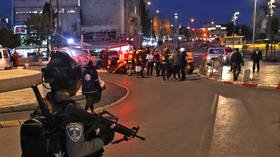Israeli military changes open-fire rules
Israeli military has amended its open-fire rules in the occupied West Bank, allowing troops to shoot Palestinian protesters who toss rocks and firebombs at cars and civilians, even if they no longer pose an imminent threat.
The policy was introduced around a month ago, but the Israel Defense Forces (IDF) has refrained from making a public announcement. A military spokesman only confirmed the changes to the Times of Israel paper on Monday, after reports about the open-fire rules emerged in the local media.
Under the new rules, IDF troops are permitted to go through the entire arrest protocol if they see a Palestinian throwing rocks and Molotov cocktails at vehicles, including the use of deadly force against the suspect even if he doesn’t have any objects in his hands.
Previously, soldiers were only allowed to fire when arresting the perpetrator while he was still in the act of tossing stones or firebombs.
The amendments were needed because the initial rules in many cases allowed the attackers to avoid responsibility for their actions, the spokesman explained.
However, he clarified that the troops are still urged to make verbal warnings and shoot in the air before actually employing deadly force. An arrest without any shots being fired still remains the preferred outcome for the IDF, the spokesman added.
The new rules only apply to attacks on civilians and supposedly do not allow shooting at the Palestinians who toss rocks at Israeli security personnel during protests.
The changes introduced by the IDF have already been questioned by legal experts. A former chief military prosecutor, Liron Libman, told the Times that “a person who is fleeing doesn’t present a threat” and that deadly force should only “be a last resort measure.”
Eliav Lieblich, a law professor at Tel Aviv University, argues the new rules contradict the international laws of armed conflict since there is no active conflict in the West Bank, as well as human rights laws due to not matching the needs of self-defense.














